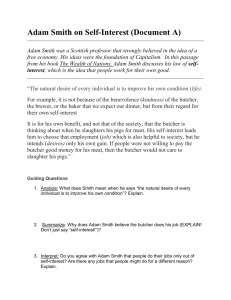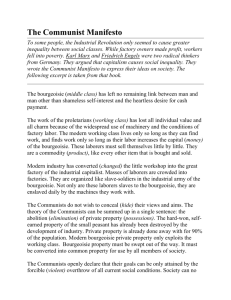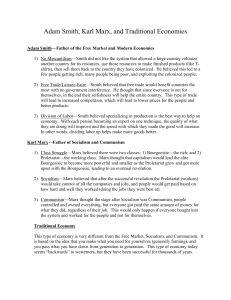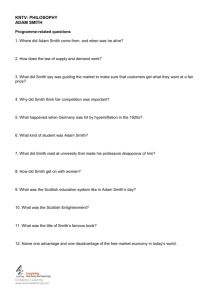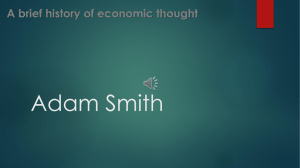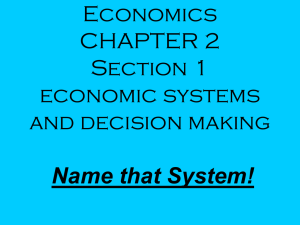Capitalism vs Socialism - Marion County Public Schools
advertisement
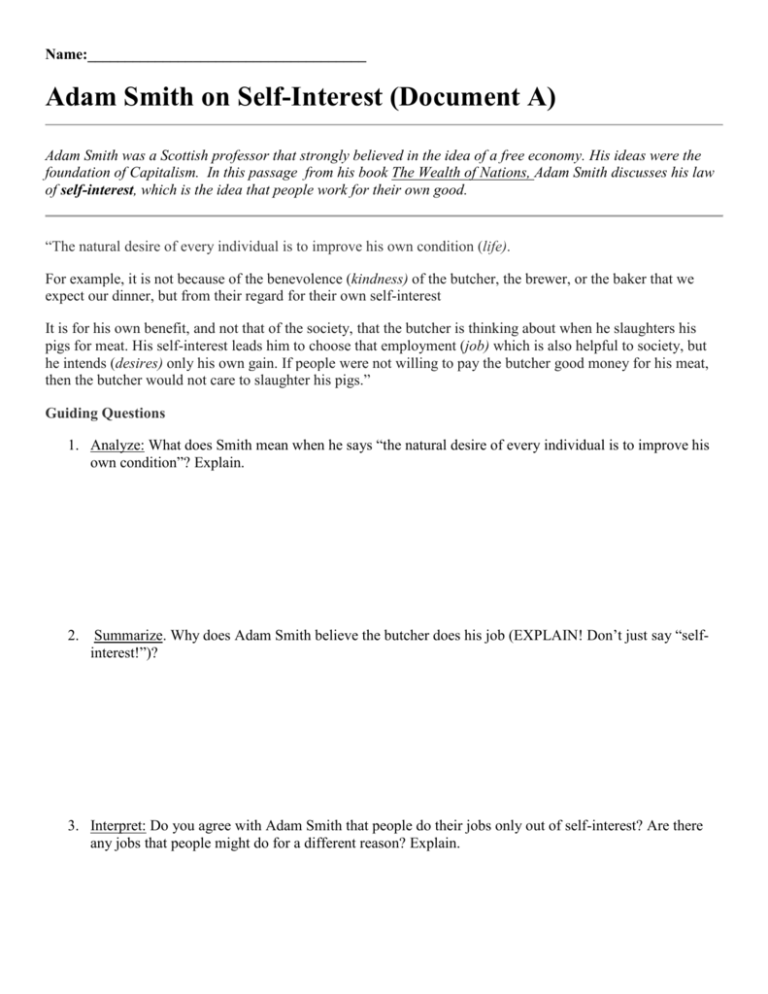
Name:_____________________________________ Adam Smith on Self-Interest (Document A) Adam Smith was a Scottish professor that strongly believed in the idea of a free economy. His ideas were the foundation of Capitalism. In this passage from his book The Wealth of Nations, Adam Smith discusses his law of self-interest, which is the idea that people work for their own good. “The natural desire of every individual is to improve his own condition (life). For example, it is not because of the benevolence (kindness) of the butcher, the brewer, or the baker that we expect our dinner, but from their regard for their own self-interest It is for his own benefit, and not that of the society, that the butcher is thinking about when he slaughters his pigs for meat. His self-interest leads him to choose that employment (job) which is also helpful to society, but he intends (desires) only his own gain. If people were not willing to pay the butcher good money for his meat, then the butcher would not care to slaughter his pigs.” Guiding Questions 1. Analyze: What does Smith mean when he says “the natural desire of every individual is to improve his own condition”? Explain. 2. Summarize. Why does Adam Smith believe the butcher does his job (EXPLAIN! Don’t just say “selfinterest!”)? 3. Interpret: Do you agree with Adam Smith that people do their jobs only out of self-interest? Are there any jobs that people might do for a different reason? Explain. Adam Smith on Competition (Document B) Adam Smith was a Scottish professor that strongly believed in the idea of a free economy. His ideas were the foundation of Capitalism. In this passage from his book The Wealth of Nations, Adam Smith discusses his law of competition, which is the idea that competition forces people to make a better product “If any trade, item, or object is beneficial (helpful) to the public, free and more general (widespread) competition will always make it more so (beneficial). It is a characteristic of man that no item or object is produced to his liking. He finds that there is need for improvement in everything. The whole industry of human life is not employed (used) to obtain the supply of our three most basic needs, which are food, clothes and lodging (housing). The industry of mankind is employed to obtain the luxuries (nice things) of life according to the nicety and delicacy of our tastes (the styles people like).” Guiding Questions 1. Analyze: According to Adam Smith, why is competition a good thing? Explain. 2. Summarize: Please read the second paragraph. What is the main point of this paragraph? Put it in your own words 3. Interpret: Do you think it is a good thing that the “industry of mankind” is not being used to supply our basic needs, but to supply “the luxuries of life?” Why or why not? The Communist Manifesto To some people, the Industrial Revolution only seemed to cause greater inequality between social classes. While factory owners made profit, workers fell into poverty. Karl Marx and Friedrich Engels were two radical thinkers from Germany. They argued that capitalism causes social inequality. They wrote the Communist Manifesto to express their ideas on society. The following excerpt is taken from that book. The bourgeoisie (middle class) has left no remaining link between man and man other than shameless selfinterest and the heartless desire for cash payment. The work of the proletarians (working class) has lost all individual value and all charm because of the widespread use of machinery and the conditions of factory labor. The modern working class lives only so long as they can find work, and finds work only so long as their labor increases the capital (money) of the bourgeoisie. These laborers must sell themselves little by little. They are a commodity (product), like every other item that is bought and sold. Modern industry has converted (changed) the little workshop into the great factory of the industrial capitalist. Masses of laborers are crowded into factories. They are organized like slave-soldiers in the industrial army of the bourgeoisie. Not only are these laborers slaves to the bourgeoisie, they are enslaved daily by the machines they work with. The Communists do not wish to conceal (hide) their views and aims. The theory of the Communists can be summed up in a single sentence: the abolition (elimination) of private property (possessions). The hard-won, self-earned property of the small peasant has already been destroyed by the development of industry. Private property is already done away with for 90% of the population. Modern bourgeoisie private property only exploits the working class. Bourgeoisie property must be swept out of the way. It must be converted into common property for use by all members of society. The Communists openly declare that their goals can be only attained by the forcible (violent) overthrow of all current social conditions. Society can no longer live under this bourgeoisie. Its existence is no longer compatible (it no longer fits) with society. Let the ruling classes tremble at the Communist revolution. The proletarians have nothing to lose but their chains. They have a world to win. Workingmen of all countries, unite! Guiding Questions 1. Interpret: How does Marx seem to view the idea of self-interest in the first paragraph (ie. a good or bad thing)? How is this similar or different to Adam Smith? 2. Close Reading: What are some of the words, phrases, metaphors, descriptions, etc Marx uses in the second and third paragraphs to explain the current condition of the proletarians (working class). Does the working class seem to be valued by society? Explain. 3. Close Reading: Please re-read the fourth paragraph. How does Marx justify his idea that all private property/possessions should be eliminated? Do you find this convincing? Explain. 4. Analyze: Re-read the last paragraph. What does Marx believe needs to happen to create a more equal society? Considering the context (ie. what was going on at this point in history), do you think Marx was justified in believing this? Explain.

